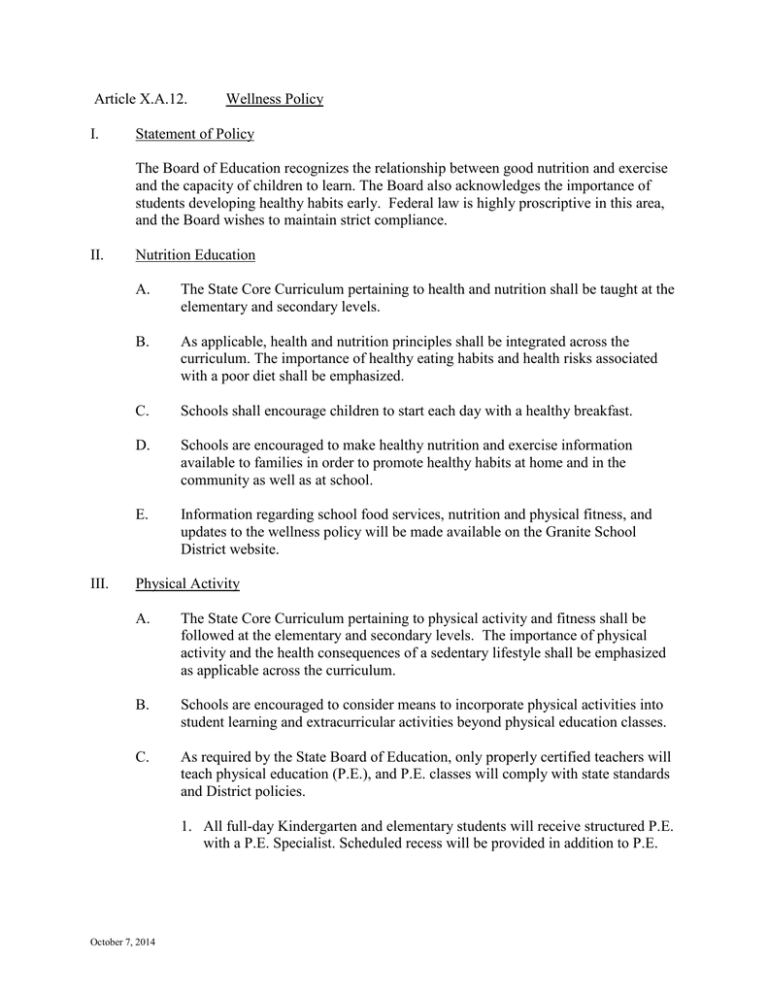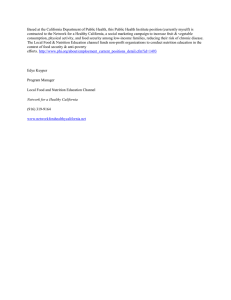Article X.A.12. Wellness Policy I.
advertisement

Article X.A.12. I. Wellness Policy Statement of Policy The Board of Education recognizes the relationship between good nutrition and exercise and the capacity of children to learn. The Board also acknowledges the importance of students developing healthy habits early. Federal law is highly proscriptive in this area, and the Board wishes to maintain strict compliance. II. III. Nutrition Education A. The State Core Curriculum pertaining to health and nutrition shall be taught at the elementary and secondary levels. B. As applicable, health and nutrition principles shall be integrated across the curriculum. The importance of healthy eating habits and health risks associated with a poor diet shall be emphasized. C. Schools shall encourage children to start each day with a healthy breakfast. D. Schools are encouraged to make healthy nutrition and exercise information available to families in order to promote healthy habits at home and in the community as well as at school. E. Information regarding school food services, nutrition and physical fitness, and updates to the wellness policy will be made available on the Granite School District website. Physical Activity A. The State Core Curriculum pertaining to physical activity and fitness shall be followed at the elementary and secondary levels. The importance of physical activity and the health consequences of a sedentary lifestyle shall be emphasized as applicable across the curriculum. B. Schools are encouraged to consider means to incorporate physical activities into student learning and extracurricular activities beyond physical education classes. C. As required by the State Board of Education, only properly certified teachers will teach physical education (P.E.), and P.E. classes will comply with state standards and District policies. 1. All full-day Kindergarten and elementary students will receive structured P.E. with a P.E. Specialist. Scheduled recess will be provided in addition to P.E. October 7, 2014 2. All secondary students will complete state mandated P.E. requirements before being eligible for graduation. P.E. teachers on both block and non-block schedules shall meet minimum activity standards, and students shall be required to spend a minimum of 50% of P.E. class time in moderate to vigorous activity. IV. V. D. Schools shall not withhold P.E. Schools are encouraged to emphasize life-long activities in P.E. to include competitive and non-competitive sports. E. Schools shall place a high priority on regularly scheduled recess and encourage students to use the time for rigorous physical activity. Elementary schools are encouraged to consider scheduling recess prior to lunch. School Based Activities A. The health and P.E. curricula shall include testing and assessment consistent with District and state policy. B. Health and P.E. instruction shall provide opportunities for students to develop and practice numeracy and literacy skills. C. Schools shall consider the principles of this policy when planning field trips, assemblies, celebrations, and other activities. D. Employees are encouraged to model healthy nutritional and exercise habits, and schools are encouraged to offer after-school programs that promote healthy nutritional and exercise habits. School Food Service A. All reimbursable meals will meet guidelines set forth by United States Department of Agriculture (USDA), along with any additional requirements mandated by the state. B. School menus, along with nutrition education and carbohydrate counts, shall be posted online at the first of each month. C. When possible, schools are encouraged to schedule meal times between 11 a.m. and 1 p.m. D. Consideration should be given to the number of scheduled meal periods and meal times in order to provide the entire student body an opportunity to eat breakfast and/or lunch. E. Schools are encouraged to provide students with a minimum of 10-15 minutes to eat each meal. October 7, 2014 VI. Competitive Foods A. Competitive foods are all foods sold on school campus during the school day outside or apart from reimbursable meals provided under the National School Lunch Program and School Breakfast Program. 1 Food items sold `a la carte, in vending machines, as concessions, for school fundraisers, or otherwise are competitive foods subject to the following Smart Snacks in School guidelines (see below). B. Smart Snacks in School guidelines establish nutrition standards for competitive foods (and beverages) sold or served in schools (see 7 C.F.R. 201.11 Interim Final Rule; www.fns.usda.gov/nslp policy). These federal guidelines are specific and subject to constant modification. Subject to allowable exceptions for fundraising activities, all schools shall comply with current nutrition standards, which include the following. C. D. 1. Snack/side items must be <200 kcals, <35% total fat, <10% saturated fat, < 230 mg sodium, and <35% sugars. 2. Entrée 2 items must be <350 kcals, <35% total fat, <10% saturated fat, < 480 mg sodium, and <35% sugars. 3. Exempt foods include fresh fruit and vegetables, canned/frozen fruits packed in 100% juice or light syrup, canned/ frozen vegetables packed in water or small amount of sugar. Smart Snacks in School rules also establish nutrition standards for beverages (included as part of competitive foods). 1. Elementary schools may sell 8 oz. portions of low-fat (1%), non-fat flavored milks, and/or 100% fruit or vegetable juice. 2. Middle Schools may sell 12 oz. portions of low-fat (1%), non-fat flavored milks, and/or 100% fruit or vegetable juice. 3. High Schools may sell 12 oz. portions of low-fat (1%), non-fat flavored milks, and/or 100% fruit or vegetable juice. In addition, some varieties of low-calorie flavored and/or carbonated beverages are allowable. Exceptions to the competitive foods rules regarding fundraisers including the following: 1. 1 Infrequent school-sponsored fundraising events or activities may include selling foods/beverages that do not comply with the minimum nutrition Competitive foods include all foods sold on school campus during school day other than reimbursable meals. School day includes midnight before to 30 minutes after the end of the official school day. School campus includes all areas accessible to students during school day. 2 Meat/meat alternate alone OR a combination food of meat/ meat alternate, whole grain items, vegetable, or fruit. October 7, 2014 standards, but such items may not be sold in food service areas during meal service. VII. VIII. 2. Fundraisers that take place outside of school or involve food products that are ordered and consumed away from the school are exempt. 3. Fundraisers that fall outside of school hours are exempt. Monitoring and Evaluation A. A Wellness Committee consisting of District employees and members of the School Food Service staff shall review the requirements imposed by National School Lunch Program, School Breakfast Program, Smart Snacks in School, and other federal or state programs annually. The Committee shall review District compliance data and develop recommendations to the Superintendent regarding revisions or modifications to District policy or practice. B. The Wellness Committee shall maintain a compliance sub-committee, which shall administer an annual assessment to measure compliance with federal standards and negotiate vending contracts that comply with current laws and regulations. Fiscal Sanctions Any fiscal sanctions imposed by state or federal agencies for violations of the National School Lunch Program, School Breakfast Program, Smart Snacks in Schools, or other related programs shall be borne by the school or department where the infractions were identified by the auditing agency, and the appropriate school or department shall reimburse School Food Service (or other department) for the amount of federal or state funds lost or withheld. October 7, 2014
